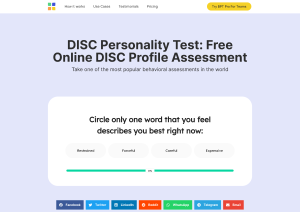Best Personality Tests For Yourself & Your Team
Every day thousands of people take personality assessments on our platform. The ranked list below is based on their reviews. The best of these personality tests are included in the BPT Pro for you and your team.
The HIGH5 test is one of the best personality assessments you can take. It is primarily used by individuals who are curious about their top strengths and want an overview of their skills. The results of the HIGH5 test are especially useful if you are planning on using a strengths-based approach to self-development. You will receive an in-depth strengths profile within just 20 minutes. In addition, the test is completely free and specific to your strengths.
Time Required: 10 Minutes
Email Sign-Up Required: Yes
Cost: Free & Paid
The 16 Personality Types is one of the most popular assessments available on the web. It is a popular iteration of the Myers-Briggs Personality Indicator or MBTI. This test is a great option for you if you want somewhat specific insights about your personality. It is also a fantastic option for you if you want a free assessment.
Time Required: 10 Minutes
Email Sign-Up Required: No
Cost: Free
The DISC test has origins dating all the way back to 1928 and psychologist Dr. William Marston. The test gives you an overall understanding of your personality and some of your key personality traits. This variation of this test includes evaluation for four factors: dominance, influence, steadiness, and conscientiousness. This assessment is useful for those who want a general understanding of their personality.
Time Required: 10 Minutes
Email Sign-Up Required: Yes
Cost: Free & Paid
Another popular assessment, the Enneagram Test gives you personality information for free, if you would like. It will categorize you into one of 9 distinct personality types and further divide you from there. This would be a great test to take if you are extremely curious about your personality and want specific information on your personality.
Time Required: 10 Minutes
Email Sign-Up Required: Yes
Cost: Free & Paid
The Big Five personality assessment is another one of the most popular tests you could choose to take. It is commonly utilized by Fortune 500 companies, too. The test is great if you want to get easy to understand information on your overarching personality. More specifically, you will get information about your extroversion, agreeableness, openness, conscientiousness, and neuroticism.
Time Required: 10-15 Minutes
Email Sign-Up Required: No
Cost: Free
The True Colors Test is also remarkably similar to the MBTI and Keirsey assessments. It is used when you want to develop your analytical skill, sympathy skills, dependability, and more. Both teams and individuals can take this assessment and gain valuable insights from it. You will be assigned a color based on your results (blue, green, orange, or gold).
Time Required: 5-10 Minutes
Email Sign-Up Required: No
Cost: Free & Paid
Build unique personality profiles for your team to help them work more effectively together
#7 HEXACO Model of Personality Structure Personality Inventory
The HEXACO personality test is often overlooked, but it is one of the best tests for finding your positive personality qualities. The test is also fantastic if you would like more information on your emotions specifically. HEXACO quantifies your levels of honesty, humbleness, conscientiousness, agreeableness, and other key positive traits.
Time Required: 45 Minutes
Email Sign-Up Required: Yes
Cost: Free & Paid
#8 Eysenck Personality Questionnaire
The Eysenck Personality Questionnaire (EPQ) is a simple assessment consisting of only yes/no questions. The Eysenck Personality Questionnaire is usually used for determining how intense someone’s negative traits are. The test evaluates neuroticism, extroversion, psychoticism, and lying behaviors. The test is useful for identifying psychological weaknesses as well.
Time Required: 12 Minutes
Email Sign-Up Required: No
Cost: Free
#8 NEO Personality Inventory
The revised NEO personality test is similar to assessments such as DiSC. It is also best used by both teams and individuals to get an understanding of their both positive and negative traits. For instance, the test will evaluate your conscientiousness, neuroticism, openness, agreeableness, and extroversion. It is essentially the Big Five test, but only a slightly modified version.
Time Required: 40 Minutes
Email Sign-Up Required: Yes
Cost: Paid
#9 Myers-Briggs Type Indicator
The Myers-Briggs Personality Type Indicator also called the MBTI, is by far one of the most popular assessments. It is available online or via personal assessments. If you are someone who is seeking to find specific information about your personality, and if you want to do it for a cheap price or free, the MBTI is a good option. It is especially effective if you want a reliable test that is utilized by many Fortune 500 companies.
Time Required: 10 Minutes
Email Sign-Up Required: No
Cost: Free
#10 The Birkman Method
The Birkamn Method is based on a text written by Sharon Fink and Stephanie Capparell. The test has been verified by numerous tests as well. This assessment can be used to determine your strengths and weaknesses as an individual. It is especially useful if you want to find your motivators and understand how to improve your teamwork as well and communication skills.
Time Required: 30 Minutes
Email Sign-Up Required: Yes
Cost: Free
#11 Keirsey Temperament Sorter
The Keirsey Temperament Sorter categorizes individuals into one of four temperaments. There are Artisans, Guardians, Idealists, and Rationalists. This is a fantastic test to take if you want a broad overview of your personality for free. It is very reliable and based on some of the research done by the MBTI test developers.
Time Required: 10-15 Minutes
Email Sign-Up Required: No
Cost: Free
#12 Caliper Profile
The Caliper assessment is one of the most objective and reliable personality assessments you could take. If you need to predict employee behavior, understand what motivates someone, and see someone’s potential strengths, this test could be very helpful for you. Many leaders utilize this test, or tests similar to this, for this reason. However, do keep in mind the test costs between $200 and $300 per person.
Time Required: 60 Minutes
Email Sign-Up Required: Yes
Cost: Paid
#13 Hogan Personality Inventory
The Hogan Personality Inventory is commonly used by teams to predict how individuals will perform. It is used to identify a person’s typical personality and how it may impact a business. From then, companies can use this information to create better instructions for the employees assist them in self-improvement, and more.
Time Required: 15-20 Minutes
Email Sign-Up Required: Yes
Cost: Paid
#14 Californian Psychological Inventory
The California Psychological Inventory, or CPI, is a fantastic tool for helping individuals become more productive at work. It will help you see your primary leadership style, how others view you as a leader or employee, and how you can become a better leader. It is detailed but succinct and relies primarily on self-reports to generate the results.
Time Required: 45-60 Minutes
Email Sign-Up Required: Yes
Cost: Paid
#15 Personality Assessment Inventory
The Personality Assessment Inventory is a broad personality assessment. It is also one of the most objective and relies on the principles of clinical psychology to develop the results. The assessment is often utilized by hospitals to develop a diagnosis for difficult to understand patients. Some individuals may take the test on their own to further discover what their extremely negative traits are. There are four scales for this test, making it relatively in-depth.
Time Required: 50-60 Minutes
Email Sign-Up Required: Yes
Cost: Paid
#16 TypeFinder Personality Test by Truity
The TypeFinder® Personality Test goes beyond the classic Myers-Briggs 16 personality types to uncover your true strengths. With nearly a million tests taken in the last month, this free assessment provides insights into the 16 personalities pioneered by Myers & Briggs, allowing you to explore your personality type and strengths.
The test involves a series of statements to which you respond based on their accuracy in describing you, ranging from “accurate” to “neutral” to “inaccurate.” It’s a nuanced way to understand aspects of your personality, including preferences and behaviors.
Time Required: 10-15 Minutes
Email Sign-Up Required: Yes, to access detailed results
Cost: Free and paid (Free for a basic overview and paid for a detailed report)
#17 16 Personality Factor Questionnaire
The 16 Personality Factor Questionnaire, developed by Raymond Cattell in the 1940s, is a personality assessment that explores human individual differences across 16 factors.
Although Cattell’s model has not gained widespread acceptance, and his statistical analysis revealing 16 personality factors has not been successfully replicated, the 16PF Questionnaire remains popular in applied psychology contexts such as counseling and human resources. This test utilizes the public domain scales from the International Personality Item Pool, developed by Lewis Goldberg, to align with the original 16PFQ goals.
Time Required: 15-20 Minutes
Email Sign-Up Required: No
Cost: Free
#18 Eysenck Personality Inventory (EPI)
Eysenck’s Personality Inventory (EPI) assesses personality through two principal dimensions: Extraversion-Introversion and Neuroticism-Stability. Developed to quantify aspects of personality, this inventory features 57 “Yes-No” questions and a falsification scale to detect response distortion.
After completing the EPI, you receive three scores: a ‘lie score’ to gauge social desirability in responses, an ‘E score’ for extraversion, and an ‘N score’ for neuroticism. These scores are plotted on a graph to illustrate your personality traits. While the EPI provides an elementary perspective on personality and may not fully capture complex individual differences, it is a quick tool for basic personality assessment.
Time Required: 5 Minutes
Email Sign-Up Required: No
Cost: Free
#19 Minnesota Multiphasic Personality Inventory (MMPI)
The Minnesota Multiphasic Personality Inventory (MMPI) is a significant psychological assessment tool for exploring personality traits and psychopathology. Initially aimed at clinical populations, its application has controversially expanded to evaluate psychological stability in high-risk professions, such as aviation, law enforcement, and the nuclear industry.
The MMPI is offered in two main versions: the MMPI-2, with 567 actual/false questions, and the more concise MMPI-2-RF, containing 338 items. The latter is designed for quicker administration.
Time Required: MMPI-2 approximately 1-2 hours, MMPI-2-RF about 40-50 minutes
Email Sign-Up Required: Not applicable, as a licensed psychologist administers it
Cost: Professionals conduct administration and interpretation, cost ranges from $1,500 to $3,500
#20 Values & Motives Inventory (VMI)
The Values & Motives Inventory (VMI) is vital for understanding an individual’s underlying motivations. They may find the most job satisfaction in these pinpointing areas and make significant contributions.
This normative self-report questionnaire delves into the energies and efforts a person will likely dedicate to various activities, informed by their values.
Time Required: 15-20 Minutes
Email Sign-Up Required: Yes
Cost: Paid (price not stated)
#21 Motives, Values, Preferences Inventory (MVPI)
The Motives, Values, Preferences Inventory (MVPI) provides deep insights into the core goals, values, drivers, and interests that propel individuals toward their aspirations. It’s a tool designed to uncover the internal factors that motivate candidates, guiding employers to understand which roles, jobs, and environments these individuals will thrive in.
Time Required: 15-20 Minutes
Email Sign-Up Required: No
Cost: Not stated
#22 California Psychological Inventory™ (CPI™)
The California Psychological Inventory™ (CPI™) is an advanced tool for unveiling leadership potential through in-depth personality insights. It operates on a sophisticated methodology to derive detailed personality insights, summarizing how others perceive an individual in leadership style.
A recent survey highlighted that 66% of organizations noted an improvement in leadership effectiveness among individuals assessed by the CPI 260®. This tool is instrumental for organizations aiming to discover and cultivate high-potential employees for further training and development.
.
Time Required: Approximately 30 min to 1 hour
Email Sign-Up Required: Not applicable, as a licensed psychologist administers it.
Cost: Not mentioned. Researching other, it ranges online from $120 to $370.
#23 Personality Assessment Inventory (PAI)
The Personality Assessment Inventory, developed by Leslie C. Morey, Ph. in 1991 and updated in 2007, is tailored for psychologists to diagnose clinical disorders and screen for psychopathology.
It’s aimed at individuals aged 18 and above and facilitates a comprehensive evaluation with a focus on clinical diagnosis, treatment planning, and psychopathology screening.
Time Required: 45 – 60 Minutes
Email Sign-Up Required: Not applicable
Cost: Answer sheets cost $122
Level:
Used for:
Online: No
Image of the test:
Image of the test results/profile:
#24 Personality and Preference Inventory (PAPI)
The Personality and Preference Inventory (PAPI), created by Max Kostick in the 1960s, is a personality assessment utilized primarily during recruitment. Its foundation lies in the concept that individuals possess unique combinations of preferences and traits across various degrees rather than being defined by dichotomous categories like “extrovert” or “introvert.”
The PAPI explores a candidate’s motivations, working style, ambitions, habits, morals, interpersonal skills, and potential workplace behaviors. There are two versions of the PAPI: the PAPI Normative (PAPI N), which compares an individual’s profile with others, and the PAPI Ipsative (PAPI I), focusing on personal personality elements without comparison to others.
The PAPI I, in particular, offers insights into one’s work and personal characteristics through 90 paired statements, requiring a choice that best resonates with the respondent.
Time Required: 15-20 Minutes
Email Sign-Up Required: No
Cost: Free
#25 True Colours
The True Colours test is designed to offer deeper insights into the complexity of your personality, emphasizing that no individual remains static across different situations.
Following an introduction to your personality through a preliminary test indicator, True Colours seeks to elucidate further how you might respond to predictable and unforeseen circumstances.
It encourages a broader understanding of your adaptive strategies and reactions depending on the context, such as environmental changes, social associations, and mood.
Time Required: 10 minutes
Email Sign-Up Required: No
Cost: Free
#26 Hermann Rorschach Inkblot Test
Established nearly a century ago, the Hermann Rorschach Inkblot Test remains a pivotal tool in psychological assessment, designed to delve deeply into an individual’s personality and mental state.
This test, known for its distinctive approach using inkblots of ambiguous shapes, prompts varied associations from the test-taker, which are then analyzed to glean insights into their psychological condition.
The test comprises ten unique inkblots, each serving as a stimulus for projecting the individual’s unconscious thoughts and feelings.
Time Required: 15-30 minutes
Email Sign-Up Required: No
Cost: Free
Level:
Used for:
Online: Yes
Image of the test:
Image of the test results/profile:
#27 Szondi Test
The Szondi Test, conceptualized by Hungarian psychiatrist Leopold Szondi in the 20th century, ventures into the realm of deep psychological exploration.
It aims to unearth the most repressed impulses within an individual through their reactions to specific photographs of psychopathological conditions. This test operates on the premise that the traits we find disturbing in others mirror those we’ve repressed in ourselves from early life stages.
Time Required: 10 minutes
Email Sign-Up Required: No
Cost: Free
FAQ
There are a plethora of different personality tests available on the market. Because of this, many individuals become overwhelmed and confused and which they should take. Each test has a target market and is best utilized for a specific set of teams and answers a specific set of questions.
However, there is no need to put off learning about your skills. Many of these tests are highly efficient and quick. You may even get results within 10-20 minutes! In this article, we will discuss the benefits of taking personality tests and which specific test is right for you.
What Is a Personality Test?
Before you take a personality test, it is wise to understand what these tests are. The first personality tests were developed by psychologists and social scientists.
A personality test, in general, is an assessment that gives you information on your traits, the way you view the world, and more. They can help you understand how you work and how you form relationships, too.
Personality tests are sometimes even used by healthcare professionals. These assessments determine if an individual has extreme negative traits, such as extreme narcissism, egotistical disorders, obsession, and much more.
Taking a personality test can help you in your self-development journey. It helps you realize what weaknesses you should avoid using and which strengths you should continue developing. This can help boost your career opportunities and increase your ability to build bonds with others.
Why Should I Take Multiple Personality Tests?
Now that you are aware of the many different types of personality tests, you may be thinking: why should I take the time to administer or take one of these assessments? There are a plethora of benefits that come along with taking personality tests.
In fact, you get even more benefits if you take more than one assessment. This is so because multiple tests give you a more complete picture of your personality. Below, we have provided you with some additional information on the benefits for individuals and teams.
Benefits For Individuals
For an individual, taking multiple personality assessments helps you acquire more job opportunities. It gives you a clearer idea of what strengths you have and how to further develop them. This will also help you feel more in control of your life, giving you less stress and more positivity.
Many individuals make significant life decisions after getting a better understanding of their strengths. For instance, if you realize that you have incredible communication skills from a personality test, you may be more motivated to start a career in that industry. It could help you discover facts about yourself you never knew, too.
Benefits For Team / Organization & Workplaces
For teams, taking multiple personality tests can also offer a plethora of benefits. Teams that are very aware of their strengths tend to perform better. They are more organized, productive, efficient, and positive.
In addition, by recognizing an employee’s personality, you can create an environment that suits them best. This decreases the risk of employee conflict and further boosts your efficiency.
If your team knows their strengths, they may also become more confident. A team of confident individuals is more likely to stay focused and positive. Plus, teams that are aware of their strengths can acquire competitive advantages. This is especially necessary with today’s cutthroat industries.
Things To Watch Out for When Taking Personality Tests
When taking a personality test, there are a few red flags you should watch out for and things to generally keep in mind. Firstly, you should ensure you stay honest. Employers will easily notice if you answer you are skilled at everything or at nothing.
It will be a red flag for them, and they may ask you to retake the test. This is inefficient and not ideal for both you and your employer.
In addition, you should not rush through the test questions. Try to genuinely place yourself in the circumstances the test brings up. Take time to think about your past when answering these questions, too.
In addition, you should ensure that the test you choose to take has some verification. You should take an assessment that at least has some basic research behind it, but one that has been repeatedly verified by research is even better. Do not take a random test you found on the 70th page of Google and expect accurate results.
FAQs About Personality Tests
Which is the most accurate personality test?
There are numerous personality assessments that have proven to be accurate over the years. One of the most popular assessments called the Myer Briggs Personality Type Indicator or MBTI is one such test. It is based on years of research by a clinical psychologist, Briggs, and her daughter.
Another test that is commonly considered to be reliable is the Big Five test. It is used by numerous Fortune 500 companies.
What is the most widely used personality test?
With so many different personality tests available on the market, it can be difficult for people to find one that fits their needs. However, many gravitate towards specific tests.
The most commonly used personality test is the MBTI or Myer Briggs Personality Type Indicator. Millions of individuals have already taken this assessment over the web. In addition, the Enneagram and Big Five assessments are both quite popular.
What is the most accurate personality test MBTI?
The MBTI is considered to be one of the most popular and accurate assessments available both online and offline. The test is based on the research by psychologist Isabel Briggs Myers and her mother Katherine Cook Briggs.
The test takes into account some of the research and theories put forth by the leading psychologist of the century Carl Jung. Plus, the test has also been verified repeatedly in recent years as one of the most accurate in the market. Many Fortune 500 companies report using it as well.
What are the questions asked in personality tests?
Personality tests ask questions to gauge various aspects of an individual’s temperament, preferences, values, and behavioral tendencies. Questions can range from hypothetical scenarios that assess how one might react in certain situations to direct inquiries about preferences, habits, and attitudes in daily life.
The goal is to identify thinking, feeling, and acting patterns that align with specific personality types or traits. By understanding these patterns, individuals can gain insights into their strengths, weaknesses, and areas for development.
Which personality test has 500 questions?
The Minnesota Multiphasic Personality Inventory (MMPI) is renowned for its extensive question bank of questions. It’s one of the most widely used and researched psychological assessment tools for diagnosing mental disorders and assessing personality structure.
Developed to assist clinicians in diagnosing mental health conditions, the MMPI is detailed and comprehensive, making it a powerful instrument for understanding complex personality and behavioral patterns. The test’s length allows for a nuanced exploration of various psychological conditions and personality aspects.
What is the 240-question personality test?
The VIA assessment, consisting of 240 questions, is a self-report questionnaire designed to identify an individual’s character strengths and virtues. It is grounded in positive psychology and aims to help individuals understand what virtues they naturally embody, such as wisdom, courage, humanity, justice, temperance, and transcendence.
By focusing on strengths rather than weaknesses, the VIA assessment provides a positive framework for personal development, offering insights into how individuals can leverage their intrinsic qualities in personal and professional settings.
How do you identify your personality?
Identifying your personality involves a combination of self-reflection, feedback from others, and, often, structured personality assessments. Attention to your natural reactions, preferences, and interests can reveal consistent traits and tendencies.
Additionally, considering how others perceive and react to you can provide external perspectives on your personality characteristics. Structured personality tests, like the MBTI or VIA assessment, offer a formalized way to explore various dimensions of your personality, providing a framework to understand how you think, feel, and interact with the world around you.
How do I prepare for a personality test?
Preparing for a personality test involves approaching the assessment with openness and honesty. It’s essential to ensure you are in a comfortable setting to reflect on the questions without rush or distraction. There is no need to study or try to “game” the test, as the goal is to capture your natural preferences and tendencies.
Read each question carefully and respond based on your instinctual feelings or behavior rather than overthinking or attempting to choose answers you believe are desirable. Remember, there are no right or wrong answers in personality tests; the aim is to gain insights into your makeup to foster growth and self-awareness.












